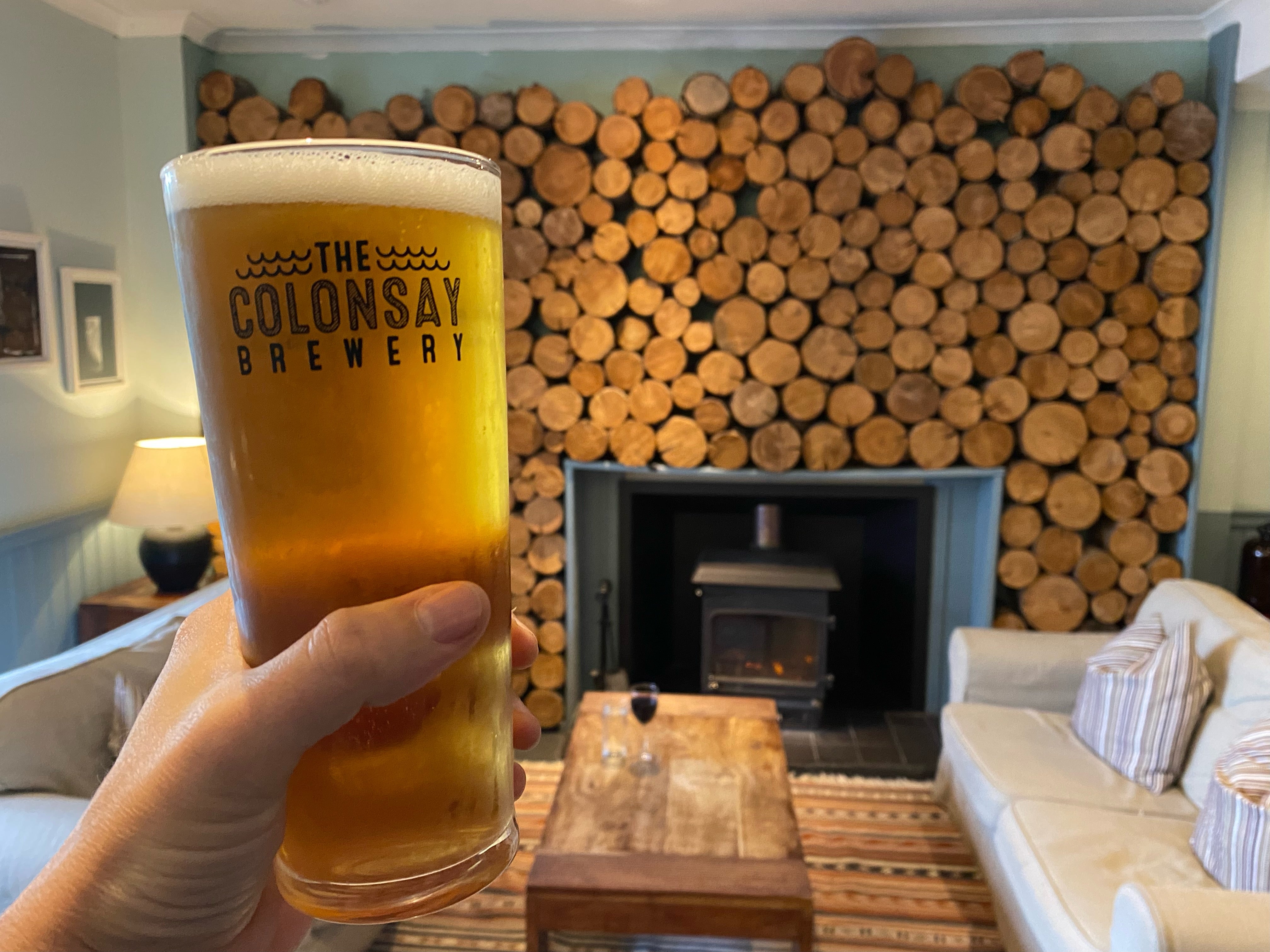
North of Scalasaig, on the island of Colonsay, the potholed single-track road took me to the beach where I sort of fell in love. It was raining, naturally, and I walked towards the ocean without plan, the golden curve of Kiloran Bay nuzzling up against a lip of machair and a hill specked with blackface ewes. I looked around and realised I could see wavelengths of light bleeding through the clouds, making the sand shine and glow. It was the beginning of a heart-loading two days that felt edifying and full of possibility.
Looking for an autumn car-free break and googling “last-minute availability”, I chanced upon the home page of the new Scottish Islands Passport app – serendipitously, it had been launched in spring. With a terrific landing picture of whaleback skerries on a glassy blue sea, the free app is a gateway to Scotland’s inhabited islands, many of which most travellers will never have heard of. Everywhere is covered, from Kerrera in Argyll and Wyre in Orkney to Fetlar in Shetland, and the idea is simple; with so many to choose from, the app plays matchmaker, helping you decide where your next holiday might be, based on what attracts you. It’s Tinder for tartan-eyed travellers. A Love Island app for thalassophiles. And even if you have no knowledge of Scotland, you could have a fair stab at it (plus, flirty emojis and GSOH abbreviations don’t apply).

There are 72 islands listed on the app and, by selecting keywords that most appealed to my personality (seafood, beach walk, gin, distillery, festivals), it filtered out dozens of profiles, acting as a liaison between me and the slender island of Colonsay, a hidey-hole on the margins of the Southern Hebrides. I imagined a seashore hotel with lobster creels stacked casually outside, a quiet local’s pub with spitting fire, a big sky under which to bike and beach walk. More than that, a place of stillness.
“Known as ‘The Jewel of the Hebrides’, Colonsay is famed for its sandy bays, stunning natural scenery, huge diversity of flora and fauna, and fascinating archaeological sites,” read the island’s app profile. It was the nudge I needed: I booked a return CalMac ferry from Oban, a bike from Colonsay Bikes and Boards, and landed at Scalasaig harbour the following week, albeit in swirling rain.
The app plays matchmaker, helping you decide where your next holiday might be based on what attracts you. It’s Tinder for tartan-eyed travellers
The courtship began at the Colonsay Hotel, both a soulful inn rooted to the sea and a tribute to the community that lives on the island. In the reception hall was a hand-written tide times forecast, with walls hung with photographs of lone crofts and shielings. Connected to the fire-lit lounge was a snug pub – the only one on the island. Alone there, my great pleasure was listening to the cadence of rain falling outside, then discovering bold Colonsay Beer Company ales by the log-framed fire. You don’t get that kind of solitude up on Skye.
Dinner in the hotel’s restaurant that night was seafood with a soundtrack of lilting fiddle, and I had the matchmaking app to thank for plate-kissing oysters, buttery scallops and soft lobster. It was hard to push the thought away that I would have the same again tomorrow. It was terrific, yet as it turned out it was the only option – during my stay, the Colonsay Pantry cafe overlooking the harbour was closed in the evenings.

A lot of Colonsay’s appeal has to do with the way it feels like a secret island, though clearly it is not. Only 125 locals live here, about half that in winter, and of the dozen houses in the scattered village of Kilchattan, for instance, 11 are rented out as holiday homes. Certainly, it puts the microscope on the issue of lack of social housing for islanders. And for those seeking coupley romance, get this: only two children live there. The prospect of the daily call of visitors on the ferry is what keeps the island in motion. That and a sense of deeply-felt determination.
In a way, this is also an island that shifts through centuries. At Palladian mansion Colonsay House, the seat of the fifth Baron Strathcona and Mount Royal, and now a series of self-catering holiday cottages and apartments, the vibe is of a Victorian country estate. There, I wandered its Wonderland garden, with knotted rhododendrons, fountains and tearoom. To the island’s south, across the tidal strand separating Colonsay from sister isle Oronsay, the brooding edifice of an Augustinian priory built in 1353 switches the timeframe to the medieval. Elsewhere, there are cryptic standing stones and wild goats said to be survivors of a Spanish Armada shipwreck in 1588.

While the app has been designed to match you with a gamut of nature, beaches and activities along Scotland’s entire seaboard, it’s also been created to support the people and communities that inhabit them. And while Colonsay remains an old-hearted destination, it carries a hint of contemporary resonance. Next door to the Colonsay Hotel, an easy stroll along a farm track patrolled by hip-waggling sheep, new-look Colonsay Smokery brings today back into hard focus – the steading, steeped in the reek of cured Atlantic salmon, opened in summer.
Another measure of newfangled island life can be had at one of two competing gin distilleries, Wild Thyme Spirits in Kilchattan and Wild Island, a short potter from the hotel in Scalasaig. On a day when the dark of the sky matched the angry sea, I hardly needed much persuasion to pop into the nearest for a tasting (free, assuming you buy a bottle, which I did). I was smitten by its brambly High Croft.
While Colonsay remains an old-hearted destination, it carries a hint of contemporary resonance
With seafood, a seductive beach walk, gin drinking and a distillery ticked off over my two days (shame, I was a week too early for the annual autumn Food and Drink Festival), it was time to catch the afternoon ferry back to the mainland. The end of this whirlwind romance was met by a convulsing sea, heavy rain and the outline of Colonsay slowly retreating to an inky sliver.
Were we made for each other? Full-figured and beautiful, yet quiet and unfussy, Colonsay lured me in ways the likes of Arran, Islay or Mull never could – and with a couple of simple app swipes and taps, I got nearly all my kicks. I’m not off the market just yet but another trip to the Southern Hebrides might well be in the air for next year.
Travel essentials
Getting there
Oban can be reached by train from Glasgow in just over three hours. The CalMac ferry from Oban to Colonsay takes 2 hours 20 minutes.
Staying there
The Colonsay Hotel has rooms from £89 B&B.
More information
Mike MacEacheran was a guest of Visit Scotland. The Scottish Islands Passport app is available on Google Play, Apple App Store and more.







